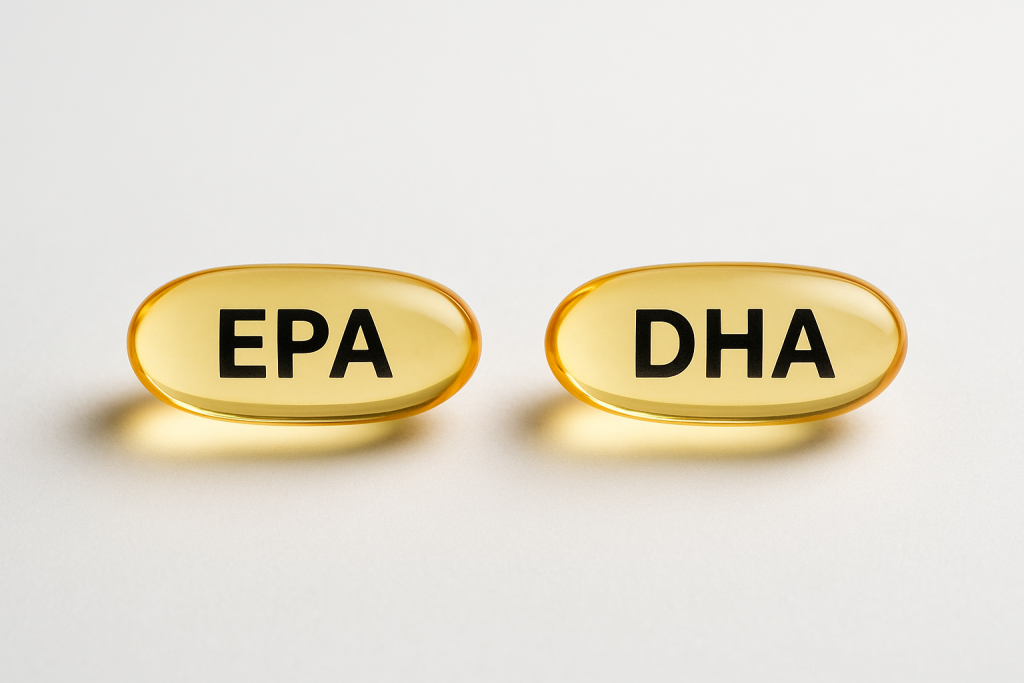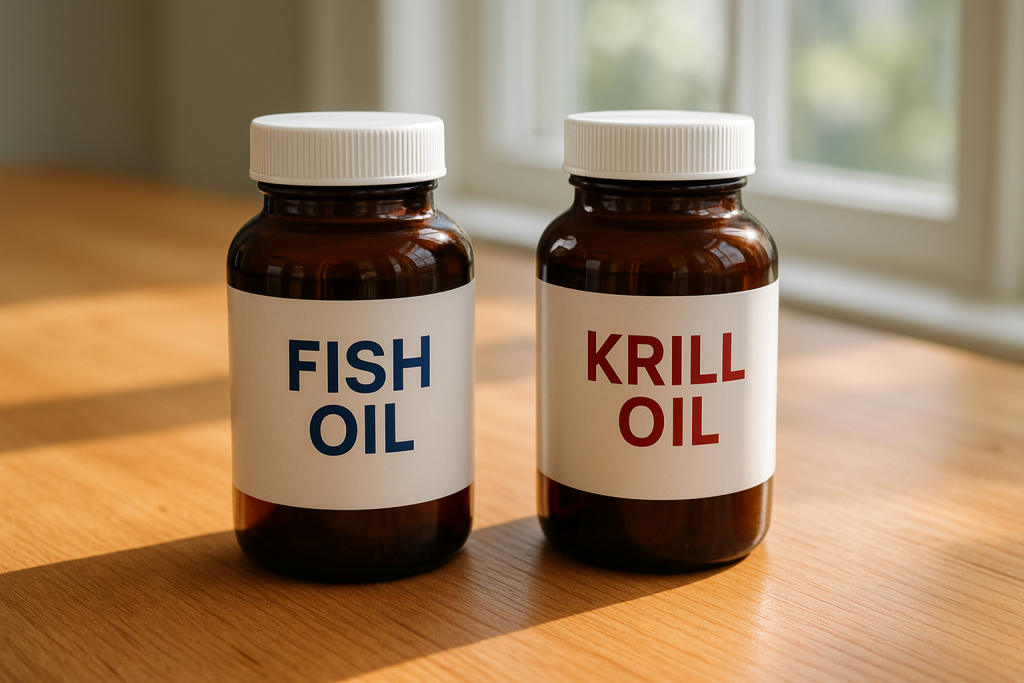Wondering which omega-3 supplement is best—or whether EPA or DHA matters more for your heart or brain? You’re not alone. With dozens of options and claims, it’s easy to feel overwhelmed.
This expert guide explains the science-backed omega-3 benefits, explains the EPA to DHA ratio, and compares fish oil vs. krill oil so you can make an informed choice for your health.
We also cover dosage, sourcing, and how to spot a high-quality supplement.
Summary / Quick Answer
Here’s a fast breakdown of what you need to know about omega-3s:
- EPA vs. DHA: DHA supports brain structure and function; EPA may support mood and inflammation.
- Best EPA/DHA Ratio: Varies by condition (e.g., 2:1 DHA:EPA for brain health, 60% EPA for depression).
- Fish Oil vs Krill Oil: Krill oil may offer better absorption, but both are effective if quality is high.
- Recommended Dose: 250–500 mg/day for general health; up to 4,000 mg for high triglycerides.
- Top Source: Marine omega-3s like algae and fish oil offer superior bioavailability over plants.
👉 See our Best Omega-3 Supplements to find vetted, research-backed options.
Types of Omega-3s and Why They Matter
There are three main omega-3 fatty acids: EPA (eicosapentaenoic acid), DHA (docosahexaenoic acid), and ALA (alpha-linolenic acid). While ALA comes from plant sources like flaxseed, your body must convert it into EPA and DHA—an inefficient process.
- ALA: Found in chia, flax, and hemp seeds; limited conversion to EPA (7–21%) and DHA (0.01–1%)
- EPA: Anti-inflammatory and may support mood, heart, and vascular function
- DHA: Critical for brain structure and development, especially in children and aging adults
👉 Explore cardiovascular benefits in depth
EPA vs. DHA: Different Benefits, Different Roles

Inflammation and Immunity
EPA reduces inflammation by generating anti-inflammatory eicosanoids. DHA goes further by deactivating inflammation pathways at the gene expression level. In clinical studies, DHA reduced more types of inflammatory markers than EPA.
| Fatty Acid | Key Anti-Inflammatory Action |
|---|---|
| EPA | Reduces leukotriene and prostaglandin production |
| DHA | Downregulates gene expression of pro-inflammatory proteins |
Brain Health and Cognition
The brain is nearly 40% DHA by fat content. It’s essential for neuronal membranes, brain volume, and long-term cognitive resilience. Studies suggest 600–900 mg of DHA daily improves memory and executive function.
EPA, although present in smaller amounts in the brain, may influence mood and support cognitive performance, particularly in individuals with inflammation-linked cognitive decline.
👉 Learn about cognitive and mood benefits
Cardiovascular Support
Both EPA and DHA lower triglycerides, but DHA raises protective HDL2-cholesterol and improves arterial elasticity. EPA is linked to reduced platelet volume, while DHA reduces platelet aggregation.
| Metric | EPA | DHA |
|---|---|---|
| Triglycerides | ↓ | ↓ (slightly more) |
| HDL Cholesterol | Slight ↓ | ↑ (HDL2) |
| Platelet Aggregation | ↓ Count | ↓ Clotting tendency |
| Blood Pressure | Neutral | ↓ in normotensive people |
EPA/DHA Ratios for Health Goals
Different health conditions benefit from specific ratios of EPA to DHA. Here’s what the research suggests:
| Condition | Suggested Ratio | Dose Range |
|---|---|---|
| General Health | 1:1 to 2:1 (EPA:DHA) | 250–500 mg combined/day |
| Depression | ≥60% EPA of total | 1–2 g/day |
| Cognitive Support | Higher DHA (2:1 DHA:EPA) | ≥600 mg DHA |
| Heart Health | Balanced or EPA-focused | 1,000–4,000 mg/day |
| Liver Support | 2:1 DHA:EPA for antioxidants | 1:2 for lipid balance |
Marine vs. Plant Sources: What Works Best?

Plant-Based Omega-3s: Limited Conversion
While ALA is abundant in chia, flax, and walnuts, conversion to EPA/DHA is minimal. Relying solely on plants may not provide enough active omega-3s.
Marine Sources: Preformed, Potent, and Absorbable
Fish oil, krill oil, and algae oil provide EPA and DHA directly. Algae oil is vegan-friendly and just as effective as fish oil in raising DHA levels.
👉 Compare these popular marine omega-3 sources
| Source | EPA/DHA Content | Bioavailability | Sustainability |
|---|---|---|---|
| Fish Oil | High | Moderate-High | Varies |
| Krill Oil | Moderate | High (phospholipid) | Moderate |
| Algae Oil | High DHA | High | Excellent |
Supplement Forms, Absorption, and Quality Standards
Not all omega-3s are created equal. Here’s what to look for:
- Form Matters: Triglyceride (TG) forms absorb ~48% better than ethyl esters (EE)
- Krill Oil: Phospholipid-bound omega-3s enhance absorption in the gut
- Third-Party Certification: Look for IFOS, NSF, or USP seals for verified quality
| Type | Absorption | Stability | Found In |
|---|---|---|---|
| TG | Excellent | Good | Premium fish oils |
| EE | Moderate | Poorer | Cheap fish oils |
| PL (krill) | High | Excellent | Krill oil |
👉 See our Best Omega-3 Supplements recomendation
Recent Clinical Trials and Findings
Several recent studies highlight how omega-3s support long-term health:
- REDUCE-IT Trial: 4 g/day EPA led to a 25% drop in major heart events
- VITAL Trial: 840 mg/day of EPA+DHA cut fatal heart attack risk by 50%
- DO-HEALTH Trial (2025): 1 g/day omega-3 slowed biological aging over 3 years
- Migraine Study: Up to 6 g/day omega-3 reduced headache frequency and severity
These trials reinforce omega-3s’ broad impact—from cardiovascular protection to brain aging and chronic inflammation management.
Oxidation, Storage, and Supplement Safety
Oxidation is one of the biggest issues affecting omega-3 supplement safety.
- What to Watch For: Rancid smell, fishy burps, flavored oils
- Storage Tips: Keep below 25°C, away from light; refrigerate in warm climates
- Shelf Life Enhancers: Look for added vitamin E or other antioxidants
IFOS testing reveals wide variation in product quality. Some flavored fish oils exceed acceptable oxidation levels, reducing efficacy and potentially harming health.
👉 Check potential medication interactions
Conclusion
Omega-3s play essential roles in inflammation regulation, cardiovascular health, brain function, and beyond. Choosing the right form, dose, and source—whether fish, krill, or algae—depends on your goals.
- For brain health: Prioritize DHA-rich sources.
- For heart health: EPA or balanced blends are best.
- For purity and absorption: Look for triglyceride or phospholipid forms with third-party certification.
For more targeted advice, explore our full guides on Omega-3 for Heart Health and Omega-3 and Brain Function.

